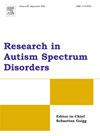Child sleep onset latency mediates parental depression and noncompliance in autistic children
IF 2.2
4区 医学
Q1 EDUCATION, SPECIAL
引用次数: 0
Abstract
Background
Parents diagnosed with depression often report that their children have difficulty following rules and falling asleep. Parents with depression are less likely to be consistent or enforce bedtimes, resulting in the child having fewer bedtime rules and getting less sleep. Over time this may mean the child develops poor sleep habits and difficulty falling asleep. Although these relationships have yet to be studied in children diagnosed with Autism Spectrum Disorder (ASD), it is an important area given that approximately 80 % of autistic children have sleep difficulties.
Methods
The current study examined whether parent-reported child sleep onset latency (SOL) mediated the relationship between parental depression and child noncompliance. The sample (N=34) consisted of parents (82 % female) reporting on their children aged 6–12 (M=8.63, SD = 2.00; 76.5 % male). All children were diagnosed with ASD and had parent-reported sleep complaints. Measures included the Child Sleep Health Questionnaire (CSHQ), the Pediatric Symptom Checklist (PSC), and a question asking if the parent had been diagnosed with depression (yes/no).
Results
Greater parent-reported child SOL significantly mediated the relation between increased parental depression and greater noncompliance.
Conclusions
These results suggest that difficulty falling asleep may help to explain why children of parents who have depression are noncompliant.
儿童睡眠开始潜伏期对父母抑郁和自闭症儿童不遵从行为有中介作用
背景被诊断出患有抑郁症的父母常常表示,他们的孩子在遵守规则和入睡方面有困难。患有抑郁症的父母不太可能始终如一或强制孩子遵守就寝时间,从而导致孩子的就寝时间规则减少,睡眠时间缩短。随着时间的推移,这可能意味着孩子会养成不良的睡眠习惯,难以入睡。尽管这些关系尚未在被诊断患有自闭症谱系障碍(ASD)的儿童中进行研究,但鉴于大约 80% 的自闭症儿童有睡眠困难,因此这是一个重要的领域。方法目前的研究考察了父母报告的儿童睡眠开始潜伏期(SOL)是否会介导父母抑郁与儿童不遵守规定之间的关系。样本(N=34)由家长(82% 为女性)报告其 6-12 岁子女的情况组成(M=8.63,SD=2.00;76.5% 为男性)。所有儿童均被诊断患有 ASD,并由家长报告睡眠问题。测量方法包括儿童睡眠健康问卷(CSHQ)、儿科症状检查表(PSC)以及询问父母是否被诊断患有抑郁症的问题(是/否)。结果父母报告的儿童SOL越多,就越能显著地调节父母抑郁程度增加与儿童不遵从治疗之间的关系。
本文章由计算机程序翻译,如有差异,请以英文原文为准。
求助全文
约1分钟内获得全文
求助全文
来源期刊

Research in Autism Spectrum Disorders
Multiple-
CiteScore
4.20
自引率
8.00%
发文量
108
期刊介绍:
Research in Autism Spectrum Disorders (RASD) publishes high quality empirical articles and reviews that contribute to a better understanding of Autism Spectrum Disorders (ASD) at all levels of description; genetic, neurobiological, cognitive, and behavioral. The primary focus of the journal is to bridge the gap between basic research at these levels, and the practical questions and difficulties that are faced by individuals with ASD and their families, as well as carers, educators and clinicians. In addition, the journal encourages submissions on topics that remain under-researched in the field. We know shamefully little about the causes and consequences of the significant language and general intellectual impairments that characterize half of all individuals with ASD. We know even less about the challenges that women with ASD face and less still about the needs of individuals with ASD as they grow older. Medical and psychological co-morbidities and the complications they bring with them for the diagnosis and treatment of ASD represents another area of relatively little research. At RASD we are committed to promoting high-quality and rigorous research on all of these issues, and we look forward to receiving many excellent submissions.
 求助内容:
求助内容: 应助结果提醒方式:
应助结果提醒方式:


